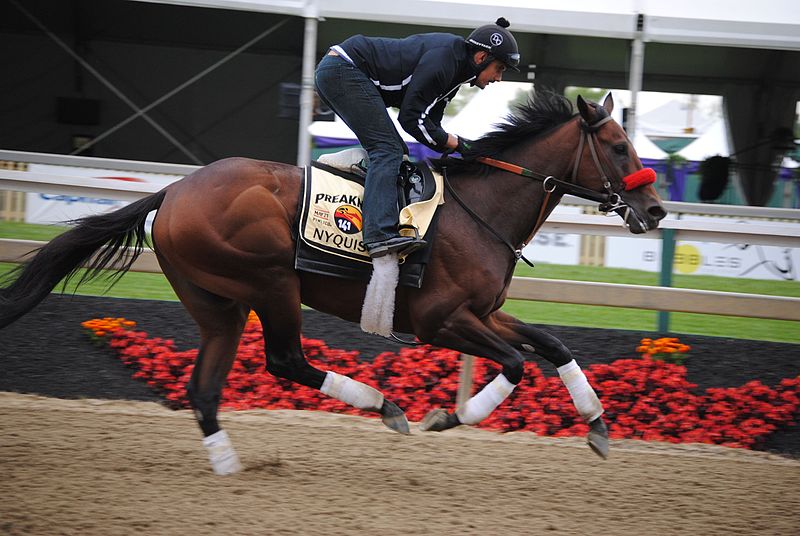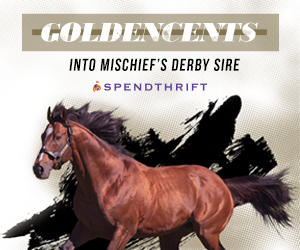
Each year since 1984, on the undercard of the big Breeders’ Cup Classic, we get to see the kids run in the Breeders Cup Juvenile. It’s a chance for the 2-year-old colts to race their way to fame and immortality on the way to a possible Kentucky Derby win or a Triple Crown.
Yet only twice in the race’s 36-year history has the winner of the race gone on to win the Kentucky Derby.
We should know by now that there are no jinxes in horse racing. After all, Justify shattered Apollo’s curse in 2018, becoming the first horse to win the Derby (and Triple Crown) when unraced at 2. But for 22 years, the Breeders’ Cup Juvenile Jinx had complete control over the 3-year-old colts.
It’s extended to the girls as well. Only two fillies have won the Breeders’ Cup Juvenile Fillies race and gone on to win the Kentucky Oaks — Open Mind in 1989 and Silverbulletday in 1999. That’s it.
Even the great 2-year-old Arazi, who turned in one of the greatest Breeders’ Cup performances in history in the 1991 Juvenile, couldn’t handle the 1992 Derby and finished eighth. More often than not, the Juvenile winner has disappointed. Many times they haven’t even run, already washed up or injured by the time the first Saturday in May comes around.
Not until Street Sense, the 2006 Juvenile winner, won the 2007 Kentucky Derby was the curse broken. And since then, it’s been broken only one other time — in 2016, when Nyquist won both races.
The jinx has continued throughout the other Triple Crown races. Only one Juvenile winner has taken the Preakness Stakes (Timber Country in 1994), and no Juvenile winner has ever won the Belmont Stakes.
Why isn’t there more success among the Juvenile winners? There are several theories and facts.
One theory is that the Breeders’ Cup Juvenile, at 1 1/16 miles, is too long of a race for such young horses, and they get worn down quickly. Two-year-old champions such as Steviewonderboy and War Pass had their careers cut short by injuries before the Kentucky Derby. This theory, of course, has been contradicted by both Street Sense and Nyquist, but it does bear some examination.
According to horse.com, “it has been suggested that many [horse injuries] stem from the training and racing of 2-year-olds. Most racehorses begin training at 18 to 20 months of age, a year or more before the skeleton has reached full maturity. Potentially, intensive training at that young age might predispose the horses to career-limiting injuries.”
Derby Winners = Late Bloomers
More than likely, though, it’s because Derby winners may develop more slowly, and you never know when they’re going to peak. Alysheba won only one maiden race in 1986 and ran third in the Juvenile, yet came on strong in 1987 to win the Derby and the Preakness en route to becoming a Hall of Fame horse.
Capote, the 1986 Juvenile winner and 2-Year-Old Male Horse of the Year, peaked too early, wit one third-place finish in six starts at 3. He finished 16th in the Derby behind Alysheba.
On the other hand, Orb, the 2013 Kentucky Derby winner, won only one of four starts at 2. The 2012 Derby winner I’ll Have Another won one of three starts at 2, including a disappointing sixth place in the Hopeful Stakes.
That being said, many superhorses are discovered at age 2. Secretariat was named Horse of the Year at 2, and other legends such as Man O’ War, Whirlaway, Count Fleet, Citation, Seattle Slew, Affirmed and Spectacular Bid all won 2-Year-Old Male Horse of the Year honors. While we would like to see great horses blossom at 2 and continue their winning ways at 3 and 4, sometimes that doesn’t always happen.
And it’s not to say success hasn’t found Juvenile winners — just for some odd reason, it hasn’t found them very often in Triple Crown races. Juvenile winners have won 28 2-year-old championships in 36 years — a kind of “Win and You’re In” commendation for winning the race. The $2 million purse is enticing as well.
But even running in the Juvenile won’t improve your chances of winning the Derby. In the 36 runnings of the Juvenile, only six horses who competed in the Juvenile went on to win the Kentucky Derby.
Jinx? Maybe not. But don’t start putting your money on the Juvenile winner when the Kentucky Derby Future Wagers roll around — unless we have a superhorse come along. Then all bets are on.
Nyquist Photo: Jlvsclrk / CC BY-SA



